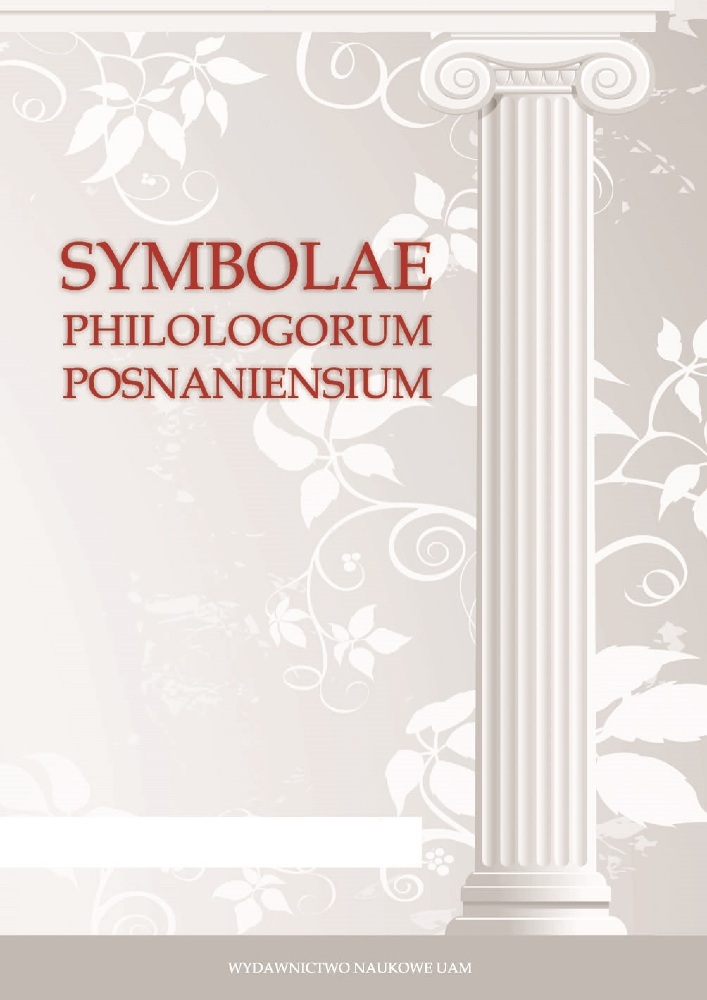Abstrakt
This paper highlights the platonic conception of old age as very different from the traditional one. In order to demostrate it, the Parmenides and the Laws will be analyzed as key texts to understand the new philosophical meaning of old age that finds his main characterization in connection with young age. The topic of old age will be discussed along with youth training and the birth of the philosopher as a “result” of a proper philosophical education. At length, well-educated youths will be able to become philosophers who, in turn, will evolve into masters of others.Bibliografia
Aronadio 1985: F. Aronadio, Il Parmenide e la sintassi ell’eidos, Elenchos 1985, 333–355.
Brisson 1982: L. Brisson, Platon les mots et les mythes, François Maspero, Paris 1982.
Brisson 1996: L. Brisson, Introduction à la philosophie du mythe, 1 Sauver les mythes, Vrin, Paris 1996.
Brisson 2001a: L. Brisson, Le Collège de veille (nukterinòs súllogos), in: F. Lisi (ed.) Plato’s Laws and its Historical Significance. Selected Papers of the I I nternational Congress on Ancient Thought (Salamanca, 1998), Akademia Verlag, Sankt Augustin 2001a, 161–177.
Brisson 2001b: L. Brisson, Vers un dialogue apaisé. Les transformations affectant la pratique du dialogue dans le corpus platonicien, in: F. Cossutta, M. Narcy (eds.) La Forme dialogue chez Platon: évolution et réception, Editions Jérôme Millon, Grenoble 2001b, 209–226.
Candiotto 2011: L. Candiotto, Il metodo adatto per Eutifrone: una calma distanza, “Peitho. Examina antiqua” 1(2)/(2011), 39–55.
Candiotto 2012a: L. Candiotto, Le vie della confutazione. I dialoghi socratici di Platone, Mimesis,Milano–Udine 2012.
Candiotto 2012b: L. Candiotto, Perché Platone scrisse dialoghi socratici? Analisi del ruolo dell’uditorio, in: A. Bordoy (ed.), Una mirada actual a la filosofìa griega. Ponencias del II Congreso Internacional de Filosofìa Griega de la Sociedad Ibérica de Filosofia Griega, Ediciones de la SIFG, Madrid–Mallorca 2012, 455–468.
Candiotto 2013: L. Candiotto, Socrate e l'educazione dei giovani aristocratici. Il caso di Crizia come esempio di mascheramento operato dai difensori socratici, in: F. de Luise, A. Stavru (eds), Socratica III . Studies on Socrates, the Socratics, and the Ancient Socratic Literature, Academia Verlag, Sankt Augustin 2013, 190–198.
Chantraine 1968 n.e. 1999: P. Chantraine, Dictionnaire etymologyque de la langue grecque: histoire des mots, Éditions Klincksieck, Klincksiek, Paris 1968.
Cornelli, Lisi (eds), 2010: G. Cornelli, F. Lisi, Plato and the City, Collegium Politicum, Contributions to Classical Political Thought, vol. 4, Academia Verlag, Sankt Augustin 2010.
Dover 1974: K.J. Dover, Greek Popular Morality, Blackwell, Oxford 1974.
Fronterotta 1998: F. Fronterotta, Guida alla lettura del Parmenide di Platone, Laterza, Roma–Bari 1998, 17–24.
Gill 2003: C. Gill, The Laws. Is it a real dialogue?, in: L. Brisson, S. Scolnicov (eds), The Laws: from Theory to Practice: Proceedings of the VI Symposium Platonicum, Academia Verlag, Sankt Augustin 2003, 42–47.
Gill 2006, Le dialogue platonicien, in: L. Brisson, F. Fronterotta (eds), Lire Platon, Puf, Paris 2006.
Havlicek, Karfìk (eds), 2005: A. Havlicek, F. Karfìk, Plato’s Parmenides. Proceedings of the Fourth Symposium Platonicum Pragense, OYKOYMENH, Praga 2005.
Larivée 2003: A. Larivée, L’incarnation législative du soin de l’âme dans les Lois: une héritage socratique?, in: S. Scolnicov, L. Brisson (eds), Plato’s Laws: from Theory to Practice. Proceedings of the VI Symposium Platonicum, Academia Verlag, Sankt Augustin 2003, 98–102.
Lavecchia 2006: S. Lavecchia, Una via che conduce al divino. La «homoiosis theo» nella filosofia di Platone, Vita e Pensiero, Milano 2006.
Lisi 2000: F. Lisi, Les fondements métaphysiques du nomos dans les Lois, Revue philosophiques, 1 (2000) 57–82.
Mattioli 1995: U. Mattioli, Senectus. La vecchiaia nel mondo classico, Pàtron, Roma 1995.
Migliori 1990: M. Migliori, Dialettica e Verità. Commentario filosofico al “Parmenide” di Platone, Vita e Pensiero, Milano 1990.
Mouze 2000: L. Mouze, Éducation et politique dans les Lois, “Cahiers Glotz”, 11 (2000), 57–69.
Mouze 2006, Eduquer l’humain en l’homme: l’oeuvre esthetique et politique du philosophe, in: L. Brisson, F. Fronterotta (eds), Lire Platon, Puf 2006, 201–208.
Nails 2002: D. Nails, The people of Plato. A prosopography of Plato and Other Socratics, Hackett Publishing Company, Indianapolis 2002.
Pradeau 2003: J.F. Pradeau, L’assimilation au dieu, in: J. Laurent (ed.), Les dieux de Platon. Actes du Colloque, Presses universitaires de Caen, Caen 2003, 41–52.
Pradeau 2008: J.F. Pradeau, La communauté des affections. Études sur la pensée éthique et politique de Platon, Vrin, Paris 2008.
Radice 2003: R. Radice, Lexicon I. Plato, Biblia, Milano 2003.
Romilly de 1971, n.e. 2001: J. Romilly de, La Loi dans la pensée grecque, Les Belles Lettres, Paris 1971.
Rossetti 2000: L. Rossetti, Le Leggi di Platone nel contesto della cultura e della letteratura giuridica attica, in: F. Lisi (ed.), Plato’s Laws and its Historical Significance. Selected papers from the first International Congress on Ancient Thought [Salamanca 1998], Academia Verlag, Sankt Augustin 2000, 203–220.
Brisson 2003: L. Brisson, Les corps des dieux, in: J. Laurent (ed.), Les dieux de Platon. Actes du Colloque, Presses Universitaires de Caen, Caen 2003, 11–23.
Brisson 2005: L. Brisson, Ethics and Politics in Plato’s Laws, “Oxford Studies in Ancient Philosophy” 28 (2005), 93–121.
Licencja
